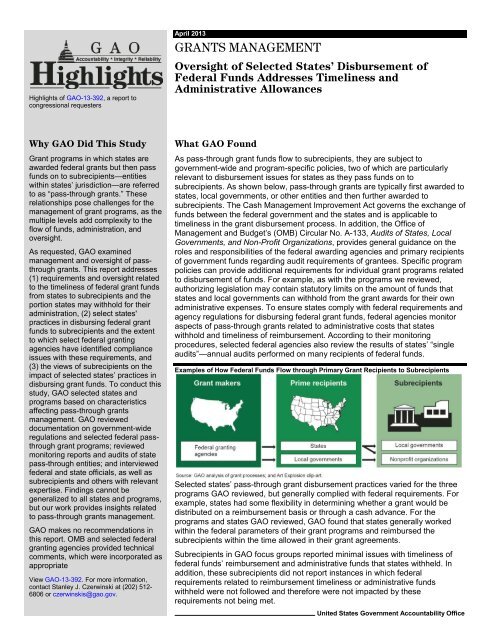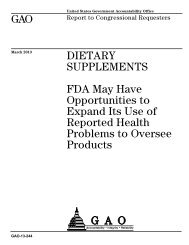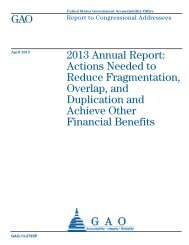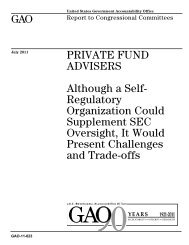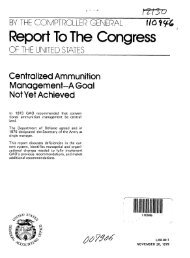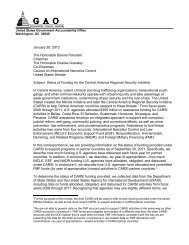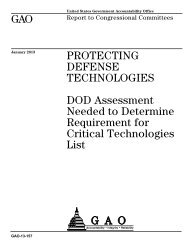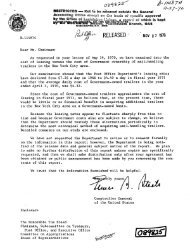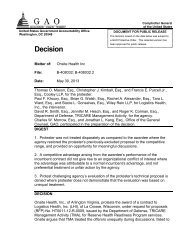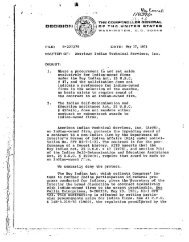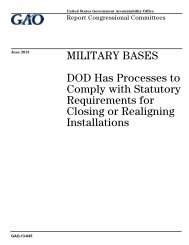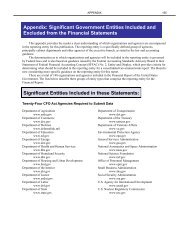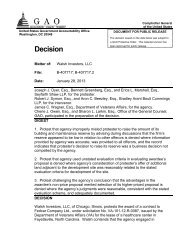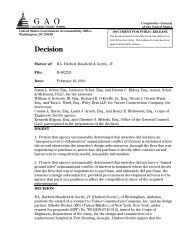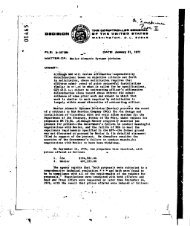GAO-13-392, Grants Management - US Government Accountability ...
GAO-13-392, Grants Management - US Government Accountability ...
GAO-13-392, Grants Management - US Government Accountability ...
Create successful ePaper yourself
Turn your PDF publications into a flip-book with our unique Google optimized e-Paper software.
Highlights of <strong>GAO</strong>-<strong>13</strong>-<strong>392</strong>, a report to<br />
congressional requesters<br />
April 20<strong>13</strong><br />
GRANTS MANAGEMENT<br />
Oversight of Selected States’ Disbursement of<br />
Federal Funds Addresses Timeliness and<br />
Administrative Allowances<br />
Why <strong>GAO</strong> Did This Study<br />
Grant programs in which states are<br />
awarded federal grants but then pass<br />
funds on to subrecipients—entities<br />
within states’ jurisdiction—are referred<br />
to as “pass-through grants.” These<br />
relationships pose challenges for the<br />
management of grant programs, as the<br />
multiple levels add complexity to the<br />
flow of funds, administration, and<br />
oversight.<br />
As requested, <strong>GAO</strong> examined<br />
management and oversight of passthrough<br />
grants. This report addresses<br />
(1) requirements and oversight related<br />
to the timeliness of federal grant funds<br />
from states to subrecipients and the<br />
portion states may withhold for their<br />
administration, (2) select states'<br />
practices in disbursing federal grant<br />
funds to subrecipients and the extent<br />
to which select federal granting<br />
agencies have identified compliance<br />
issues with these requirements, and<br />
(3) the views of subrecipients on the<br />
impact of selected states’ practices in<br />
disbursing grant funds. To conduct this<br />
study, <strong>GAO</strong> selected states and<br />
programs based on characteristics<br />
affecting pass-through grants<br />
management. <strong>GAO</strong> reviewed<br />
documentation on government-wide<br />
regulations and selected federal passthrough<br />
grant programs; reviewed<br />
monitoring reports and audits of state<br />
pass-through entities; and interviewed<br />
federal and state officials, as well as<br />
subrecipients and others with relevant<br />
expertise. Findings cannot be<br />
generalized to all states and programs,<br />
but our work provides insights related<br />
to pass-through grants management.<br />
<strong>GAO</strong> makes no recommendations in<br />
this report. OMB and selected federal<br />
granting agencies provided technical<br />
comments, which were incorporated as<br />
appropriate<br />
View <strong>GAO</strong>-<strong>13</strong>-<strong>392</strong>. For more information,<br />
contact Stanley J. Czerwinski at (202) 512-<br />
6806 or czerwinskis@gao.gov.<br />
What <strong>GAO</strong> Found<br />
As pass-through grant funds flow to subrecipients, they are subject to<br />
government-wide and program-specific policies, two of which are particularly<br />
relevant to disbursement issues for states as they pass funds on to<br />
subrecipients. As shown below, pass-through grants are typically first awarded to<br />
states, local governments, or other entities and then further awarded to<br />
subrecipients. The Cash <strong>Management</strong> Improvement Act governs the exchange of<br />
funds between the federal government and the states and is applicable to<br />
timeliness in the grant disbursement process. In addition, the Office of<br />
<strong>Management</strong> and Budget’s (OMB) Circular No. A-<strong>13</strong>3, Audits of States, Local<br />
<strong>Government</strong>s, and Non-Profit Organizations, provides general guidance on the<br />
roles and responsibilities of the federal awarding agencies and primary recipients<br />
of government funds regarding audit requirements of grantees. Specific program<br />
policies can provide additional requirements for individual grant programs related<br />
to disbursement of funds. For example, as with the programs we reviewed,<br />
authorizing legislation may contain statutory limits on the amount of funds that<br />
states and local governments can withhold from the grant awards for their own<br />
administrative expenses. To ensure states comply with federal requirements and<br />
agency regulations for disbursing federal grant funds, federal agencies monitor<br />
aspects of pass-through grants related to administrative costs that states<br />
withhold and timeliness of reimbursement. According to their monitoring<br />
procedures, selected federal agencies also review the results of states’ “single<br />
audits”—annual audits performed on many recipients of federal funds.<br />
Examples of How Federal Funds Flow through Primary Grant Recipients to Subrecipients<br />
Selected states’ pass-through grant disbursement practices varied for the three<br />
programs <strong>GAO</strong> reviewed, but generally complied with federal requirements. For<br />
example, states had some flexibility in determining whether a grant would be<br />
distributed on a reimbursement basis or through a cash advance. For the<br />
programs and states <strong>GAO</strong> reviewed, <strong>GAO</strong> found that states generally worked<br />
within the federal parameters of their grant programs and reimbursed the<br />
subrecipients within the time allowed in their grant agreements.<br />
Subrecipients in <strong>GAO</strong> focus groups reported minimal issues with timeliness of<br />
federal funds’ reimbursement and administrative funds that states withheld. In<br />
addition, these subrecipients did not report instances in which federal<br />
requirements related to reimbursement timeliness or administrative funds<br />
withheld were not followed and therefore were not impacted by these<br />
requirements not being met.<br />
United States <strong>Government</strong> <strong>Accountability</strong> Office


